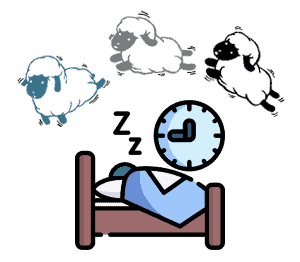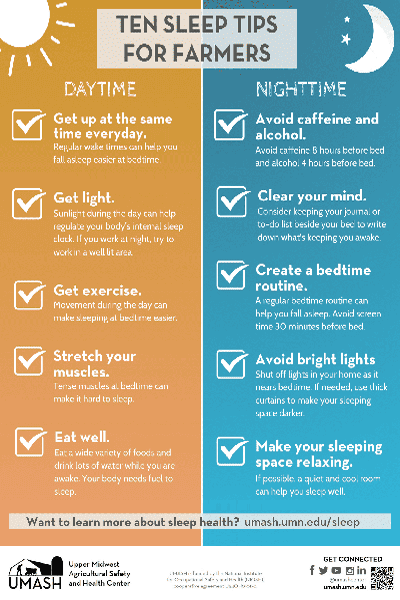MAY 2023
 Since there are always so many things to get done on the farm, it can be hard to get healthy sleep. Sleeping too little, too long, or experiencing other sleep problems like struggling to fall asleep or stay asleep can leave farmers feeling exhausted. This can make mistakes or injuries more likely to happen.
Since there are always so many things to get done on the farm, it can be hard to get healthy sleep. Sleeping too little, too long, or experiencing other sleep problems like struggling to fall asleep or stay asleep can leave farmers feeling exhausted. This can make mistakes or injuries more likely to happen.
Adults who get less than 7.5 hours of sleep per night are over twice as likely to be injured. Operating machinery while drowsy from poor sleep can be very dangerous. Drowsiness can make it harder to pay attention to the road and make safe, quick decisions. Ongoing sleep problems can increase the likelihood of developing health conditions like obesity, diabetes, cardiovascular disease, and mental health symptoms.
To help farmers, farmworkers, and their families get quality sleep, UMASH compiled a toolkit of resources to support sleep hygiene. Consider the following daytime and bedtime tips for healthy sleep.
- Get up at the same time every day. Regular wake times can help you fall asleep easier at bedtime. You may already do this to accomplish your farmwork.
- Get light. Try to get some sunlight during the day to help regulate your body’s internal sleep clock. If you work at night, try to work in a well lit area.
- Get exercise. Movement during the day can make sleeping at bedtime easier. If you are moving while doing farm work - that counts!
- Stretch your muscles. Tense muscles at bedtime can make it hard to sleep. Try stretching when you take a break during the day.
- Eat well. Eat a wide variety of foods and drink lots of water while you are awake. Giving your body the fuel it needs can help make falling asleep and staying asleep easier. Check out our Eat Well to Stay Well checklist for more information.
- Avoid caffeine and alcohol. Caffeine can make it harder to fall asleep and alcohol can prevent deep sleep. Avoid caffeine 8 hours before bed and alcohol 4 hours before bed.
- Clear your mind. Farming can be stressful. Consider keeping your journal or to-do list beside your bed to write down what's keeping you awake.
- Create a bedtime routine. A regular bedtime routine can train your brain to expect sleep. If you can, choose activities that clear your mind, like reading or stretching. Avoid screen time 30 minutes before bedtime.
- Avoid bright lights. Shut off some lights in your home as it nears bedtime. If you work at night and sleep during the day, use thick curtains to make your sleeping space darker. This will tell your brain it is time to sleep.
- Make your sleeping space as relaxing as possible. For example, a quiet and cool room can help you sleep well.
Looking for more ways to improve your sleep?
Check out these resources to help you start sleeping better.
If your sleep problems continue, see a doctor to get your symptoms checked out.
Tips and Tricks For Better Sleep – University of Nebraska Lincoln Extension – Follow these tips and tricks to improve your sleep. Spanish: Consejos y trucos para dormir mejor
Healthy Sleep Habits – American Academy of Sleep Medicine – Starting a healthy sleep routine can improve your sleep.
What To Do When You Can’t Sleep – Sleep Foundation – Use relaxation techniques to make falling and staying asleep easier.
Stretching before Sleep – Sleep Foundation – Stretching can help relax muscles and reduce stress, helping you fall asleep more easily at night.
Agrisafe Yoga (English) (Spanish)– Agrisafe – Yoga can help you to relax your muscles and reduce stress – helping you get better sleep.
Bedtime Calculator – American Academy of Sleep Medicine – Use this bedtime calculator to see what time you should go to bed based on your age and when you wake up.
Sleep & Chronic Diseases – Center for Disease Control and Prevention – Poor sleep can put you at higher risk for diabetes, cardiovascular disease, obesity and depression.
Fishing Forward Podcast: S1 E6 – Sleep ; Fishing Forward Podcast: S1 E7 Sleep (Part II) – Northeast Center for Occupational Health and Safety – Long term sleepiness can cause problems with aging, brain health and other physical health problems.
Depression & Sleep – Sleep Foundation – Sleep problems can make depression worse and depression can make sleep problems worse. Breaking this cycle can be hard – learn about what you can do.
Anxiety & Sleep – Sleep Foundation – Is worrying keeping you up at night? Learn about how anxiety can make it hard to fall asleep and stay asleep.
Farm Safety Check: Stress and Wellness – UMASH – Poor or disturbed sleep can be a sign of stress.
Alcohol & Sleep.– Sleep Foundation – Even small amounts of alcohol can make it hard to get deep sleep, leaving you tired the next day.
Caffeine & Sleep – Sleep Foundation – Caffeine can stop your brain from chemicals that help you fall asleep – keeping you up at night.
How to Determine Poor Quality Sleep – Sleep Foundation – Unsure if your sleep quality needs to improve? Look out for these tell-tale signs and symptoms.
Find a Healthcare Center for Sleep – Sleep Foundation – If you see a doctor and they think you may need to see a sleep specialist, you can search for one here.
Sleep Diary – National Heart, Lung and Blood Institute – To prepare to see a doctor, keeping a sleep diary to bring to your appointment can help the doctor see if any daily activities could be impacting your sleep.
Sleep Disorders: What they are, their causes and symptoms, and how people with sleep disorders can get relief– Sleep Foundation – Learn about common sleep disorders and how they are treated.
Guide to Healthy Sleep – United States Department of Human Services – Use this comprehensive guide to learn about the basics of sleep, common sleep myths, tips for a good night’s sleep, and much more.
Sleep: An Important Health and Safety Concern at Work – Center for Disease Control Workplace Health and Resource Center – Workplace programs can help employees get enough sleep and stay safe on the job.
Drowsy Driving – Asleep at the Wheel – Center for Disease Control and Prevention – Driving while sleepy makes crashes more likely.
Identify Responder Fatigue – National Institute for Occupational Safety and Health (NIOSH) – Know the signs of someone who is sleep deprived and fatigued to prevent injuries on the farm.
Talking Total Farmer Health Podcast, Episode 16: Sleep and Your Health – Agrisafe – Not getting enough sleep is dangerous – it can harm your health and make work more dangerous on the farm.
Fatigue – National Center for Farmer Health – Being fatigued from lack of sleep or poor sleep increases the risk of injuries on the farm.
Farm Safety Check: Fatigue – UMASH – Operating machinery when you’re sleepy can be as dangerous as operating machinery under the influence of drugs or alcohol.
 People of all races and ethnicities experience sleep problems. However, people of some racial groups experience more sleep problems than others. What causes this difference?
People of all races and ethnicities experience sleep problems. However, people of some racial groups experience more sleep problems than others. What causes this difference?
Due to racial discrimination, people of color are more likely to work long or irregular hours, live in neighborhoods with more noise and air pollutants and experience more financial stress. These added stressors make it more difficult to get healthy sleep.


 Daytime Tips
Daytime Tips  Bedtime Tips
Bedtime Tips 
Social Media Toolkit
Want to share the importance of healthy sleep? Use this social media toolkit to share the tips far and wide.
DOWNLOAD